- Home
- Laura Purcell
Bone China Page 17
Bone China Read online
Page 17
Louise swivelled round on the stool. ‘But Papa, you are no mad doctor.’
‘No,’ he admitted. ‘That is exactly the point. Should you like Creeda to have her head shaved and rubbed with vinegar? To see her chained and doused with ice water?’
Her mouth fell open. ‘Truly, she … she is a young girl, to suffer from delusions,’ she stammered. ‘What can she be – fifteen, sixteen?’
‘Kitty’s age.’
Louise was silenced.
Ernest noticed his hands were shaking. He tried to take a breath, but his throat was painfully tight. ‘Louise, I want you to imagine for a moment that you are a woman, not advanced with the experience of a great many years, responsible for the well-being of a small child. A child, shall we say, of about five. This poor little creature has endured a travail, the likes of which would fell grown men. Naturally, the child seeks to find meaning for her suffering; she wishes to know what has caused it and yet … How do you explain such depravity? The meaningless cruelty of the world, when she is obliged to go on living in it? How are you to tell her when you scarcely know yourself …’ He stopped, aware he had grown excessively animated. Louise was staring. He gulped another breath. ‘Now, if you were this woman, would you relate the cold, immovable facts as you understand them to the child? Or would you not rather couch them in terms she is more likely to comprehend? A fairy tale with wicked imps, for example. Something altogether more … palatable.’
‘I do not understand you, Papa.’
His darling girl. He wanted to shield her from this. ‘My dear, I am speaking of Creeda’s aunt. I am afraid she was put in this very position when Creeda was abducted in her youth. The child went missing for an entire year.’
‘Good God,’ she said with quiet feeling. ‘Abducted by whom?’
The twisted blackguards who paid for such things. Many had come to his door with their chancres of venereal disease, exclaiming that even lying with a child had not cured them. It had taken all his restraint not to run them through with his lancet. They might pollute those poor children, but he was damned if they were going to sully the innocence of his own daughter.
‘That remains unclear. But one of the brutes had an attack of conscience and fetched her back home.’
When Creeda spoke of her rescuer, she described snowy white skin and a red mouth like a wound. Rather like a consumptive. Or a whore, powdered and rouged.
He felt a reluctant admiration for this brave prostitute. In all likelihood, her madam would have beaten her to death for saving the child.
Louise had turned very pale. ‘Merciful heavens.’
‘Creeda did not know her mother. She looked to her aunt to explain her experience and I am afraid that … It was ill advised, but understandable in the circumstances. The aunt told Creeda that she had been taken away by the fairies.’
‘And the poor girl still believes it,’ Louise breathed.
‘Yes. That is the reason for her somewhat – indecorous – behaviour. The Nancarrows pay me well to watch her, but that is of no consequence if she causes you distress.’ He twisted his fingers together. The mourning ring glinted. Hair trapped beneath glass. ‘Do you want me to send her away, my dear?’
‘No.’ Louise rose sadly to her feet. ‘Good gracious, no. She is an unfortunate soul. We must help her, Papa.’
His kind girl. He only hoped his ability was equal to her compassion.
Chapter 23
Pompey took a liking to the stables, where he could spend his days agitating the chickens penned just beyond his reach. Louise went to collect him as evening began to descend on Morvoren House.
To her fancy, the sea sounded kinder in the twilight. No longer impatient, chopping this way and that, but respiring softly, as a child in slumber. There was comfort in it. She longed to be off her lonely clifftop, walking barefoot on the stretch where stones gave way to sand.
How pleasant it would be to simply wander, with no companion save for her faithful dog, and breathe in the fresh sea air. Let her troubled thoughts wash away with the tide.
Pushing open the door to the stables, she found Gerren climbing the ladder to the hayloft. He held one lamp in his hand; another hung on a nail beside the cows.
‘Where is my rascal, then?’ she called.
At the sound of her voice, Pompey came scampering across the hay-strewn floor, his tail wagging.
‘Been fixin’ to drink milk from Betsey, missus,’ Gerren drawled. ‘Had to fetch un a dusting.’
Louise knelt down and let Pompey clamber onto her. ‘Oh dear. I trust you were not too harsh on him?’
But she knew Gerren was soft-hearted towards the animals; he had a calm manner that drew them to him. Besides, he was a skinny whip of a thing. Eleven years old, or twelve at most. He lacked the strength to cause any real damage.
‘What do it matter, missus? Beast don’t mind a word I say, dustin’ or no.’
She laughed for the first time that day. Was it odd that she envied Gerren and his night here amongst the animals, breathing in their tang and the sweet warmth of hay? Despite the modern comforts of her room and the decorations Mama would have adored, it still did not feel like home.
However, the landscape was a different prospect. She loved the untamed beauty of Cornwall. How it rose, fell and curved. Its vital breath. Even the granite and moorland were not wholly bleak; here and there were flashes of vivid colour. Mines pocked the county like a honeycomb, yet they did not spoil it.
Towns were all very well, but she knew she would struggle to return to one now. How artificial it would feel. She belonged out here, where the only order was that of nature itself.
‘Tell me, Gerren,’ she said, as she fondled Pompey’s silky ears. ‘Were you bred in this area?’
‘Aye, missus.’
‘And is there a stretch of beach where one might walk, unmolested, without the tide cutting them off?’
The lamplight flickered on his face. ‘Away from the caves?’
‘Yes,’ she said emphatically. ‘As far away from the caves as possible.’
*
Never before had she committed an act of such daring. To walk alone, by night, with only Gerren’s lamp to guide her! But she did not experience the thrill of misbehaviour; there was no shortness to her breath and her pulse came steady. There was a calmness to this beach on the north side of the cliff. As silver moonlight played upon the water, it was impossible for Louise to feel anything except serenity.
Even Pompey appeared pacified, trailing behind her. He did not caper after the waves. Once or twice he cocked his head at their two shadows, thrown against the cliff face by the lamp, but that was all. Smells absorbed him: millions of tiny nuances to which Louise was insensible and always would be.
She held her lantern higher. Clumps of seaweed lay upon the beach. A few puddles remained where the tide had been and gone and their still water reflected a sprinkling of stars. Who could imagine Creeda, or anyone, facing horrors in a place like this? It was beautiful, eternal. She regretted their cave on the other side of the cliff. An ugly scar on the landscape, marring the peace with sickness and death.
Pebbles tinkled down behind her. She heard Pompey’s paws scrabbling over shale. What was the little scoundrel about now?
She swung the lantern around. The dog was facing the cliff. He looked as if someone was offering to throw him a ball: backing up before darting forward, impatient. Had he seen a bird nesting in the rocks? No matter how high she raised the lamp, she saw only the rough stone. But Pompey’s gaze remained fixed.
‘What are you doing?’
He planted his feet square. A growl rumbled in his throat, and suddenly he barked.
The sound that answered him took her breath away. It was like branches breaking, but there were no trees here, only the valerian growing in the rocks.
The rocks.
One thudded down, dark as a lump of coal. It landed with a spray of pebbles beside the dog. Everything was sliding, melting. A landslide.
<
br /> ‘Pompey!’
He whimpered.
‘Pompey, run!’
Another creak.
She could not move, could not tear her eyes away. She would have to watch. She would have to watch another one die.
Black spots crowded into her vision. There was a great whump, and she felt a gust of wind sweep over her, taking her glasses with it.
It was impossible to see clearly now. As she squinted, one of the shadows seemed to expand and lengthen into something tall and thin. Pebbles stung her arms. The last thing she saw before a cloud of sand engulfed her was the dark shape, falling over Pompey.
*
Pain rang at her elbow. Coughing, she wiped a hand over her gritty face. Sand was in her hair, on her lips, up her nose. The lantern had gone out. She let it drop.
Before her lay a small mound of rubble, indistinguishable in the gloom.
Pompey.
Tears tracked their way through the sand on her face. How had it even happened? Surely, landslides only occurred in heavy rain? The night was clear, if cool, the moon sailing free of clouds. It should not be possible.
It should never be possible for one person to lose so much.
Her spectacles lay half buried at her feet, their shape jutting through a thin layer of sand. She scooped them up. The frame was a little bent. A hairline scratch marked the left lens, but when she settled the wires back over her ears, she could see perfectly well. She was not sure if that was a blessing or a curse.
Louise took a deep breath, readying herself for what she must do. Then she heard the cough.
Her heart leapt. ‘Pompey?’ But it was not the shallow cough of a dog. This was deeper – a sound she knew well. The consumptive choke. It came again, harsher this time. Foolishly, she thought of Kitty. All the long-forgotten childhood stories of ghosts and spirits came back to her. ‘Is … is someone there?’
Pompey yipped.
The rush of hope shook her more fiercely than the landslide had done. Crying out, she leapt forward to the pile of debris.
Most of it was sand. She moved what stones she could and dug. First, she saw the shirt – one that she had sewn herself, drenched in mud. The man was lucky – he had caught the very edge of the cascade where the scree was thin.
‘Are you hurt?’ she spluttered through the sand in her mouth.
‘Nah. I’m a hard nut to crack.’ Despite these brave words, the voice that spoke them was strained and hoarse. Louise dug faster.
‘Here.’ She tapped the man cautiously, unsure which part of his body she was touching. ‘This way is up. I am digging from here.’
He began to writhe. She heard him trying to dig, too, and the clink of Pompey’s collar. At last she caught glimpses of the space within: a smaller, darker cave.
There was a scuffling sound, and Pompey’s head burst from the hole she had made. His ears pricked up; he looked delighted with himself.
‘Pompey!’ She lifted him out, receiving a barrage of licks to her face. She ran her fingers through his matted fur, searching for a wound, but there was nothing. Not a scratch upon him.
The reason for that soon became clear. As she put the dog down and recommenced her excavations, she saw the man inside the little hollow was crouched on his hands and knees. He had thrown himself bodily over Pompey as the cliff crumbled, taking the force of it himself.
‘Harry? Is that you?’
He turned slightly, wincing as he did so. ‘Yes, miss.’
‘What are you doing here?’
Her nails were cracked and the muscles in her arms were screaming, but she managed to move the last few rocks and haul the man up.
The sight of him terrified her. He had broken his nose and was half blinded with blood. His glistening, almost translucent skin had bruised purple and yellow like the flowers on the clifftop.
‘Here, lean on me. Can you climb out of this hole? It is just a short way.’
He was not heavy, for a man. She felt the bones beneath his skin as she pushed him before her.
A sorry sight the three of them made on the moonlit beach, spluttering, trellised in salt and sand. Their clothing was ruined. Pompey ricocheted between his mistress and his rescuer, keen to lick off every trace of their adventure.
The oily black waves rushed in calmly, as if nothing had happened.
‘Come, let us wash your nose in the salt water. Careful, it will sting.’
He obeyed without question, letting her guide him to his knees in the surf and cup water over the wound. He did not flinch as she expected.
‘What were you doing all this way from the cave? Does my father know you are walking about?’
‘You’re very welcome, I’m sure,’ he replied sourly.
She cursed herself. ‘Do forgive me. Of course I am beyond grateful that you saved my dog. Words cannot express … But truly, I worry that you are hurt.’
His face twisted. ‘Hurt? I’m dying. You know that.’
The wonder was that he could talk at all after taking such a knock to his weakened frame. Sharp collarbones rose up from the neck of his ruined shirt, reminding her painfully of the collection of hare bones Creeda had found.
‘Have you so little faith in our treatments?’
Harry wiped the blood from under his nose. He looked more unwell by moonlight, without the flush and sparkle. ‘They might give me a bit longer. But a cure for consumption? You’ll sooner find a hen with teeth. I’ll keep living each day as if it’s my last – if it’s all the same to you.’
Her shoulders were trembling. The shock, perhaps, and the chill of the sea.
‘The span of your days will be shorter if you do not rest,’ she explained, rising and dragging her sodden skirts with her. ‘Why are you on this beach? Were you …’ Another shiver took her. ‘You were not following me?’
Harry laughed and was instantly racked with a coughing fit. He doubled over, spitting something into the water before straightening up.
‘No doubt the lads do follow you, miss. But I’m afraid I an’t one of your conquests. It’s the caves.’ He pointed to a narrow cleft in the rock face, some two hundred yards behind her. ‘They run all the way through, if you know which way to go. I come here often.’ In an undertone, he muttered, ‘God knows there’s no sleep.’
The image of the cave at night rose up before her: the ghostly tendrils of pipe smoke, moonlight bouncing off the waves and playing in ripples on the ceiling. Disembodied coughs. Somewhere, deep within the cavern, that constant drip.
No wonder he wanted to escape.
‘I will not tell my father,’ she promised, looking down at him. ‘About this beach, at least. But we will have to say something. These are not injuries you can disguise.’
He regarded her. ‘I reckon I’m not the only one in trouble with the doctor.’
She flushed. ‘Never mind about that.’
Harry struggled to his feet, ignoring her outstretched hand. Pompey jumped over the sea foam to beat his tail against the man’s leg.
‘Do you trust me with your dog?’
‘Trust you?’ she repeated. ‘You saved his life.’
‘Then leave him with me. I’ll let him out of my hut in the morning, tell your da I saved him from the rocks. He’s not to know the daft thing didn’t escape from your house.’
A criminal, she told herself. This man is a criminal. But she couldn’t believe it.
‘That is tremendously kind of you.’
Harry shrugged.
‘I do not …’ She glanced doubtfully at the pile of rocks where the cliff had crumbled. ‘I do not suppose you could take me back with you, through the caves? I have no idea of my way home …’
He was sickly, dirty and bleeding, yet still there was a certain light when he smiled, the crinkles that appeared beside his eyes and the gentle curve of his mouth. A spark disease would never quite quench.
‘Well,’ he grinned. ‘I reckon you’ll be owing me a few favours, miss.’
Chapter 24
&
nbsp; Pompey placed his head on Louise’s thigh, awaiting crumbs from her breakfast.
Papa tutted at him. ‘You see the rascal is unabashed by his ordeal.’
‘I cannot think how he came to escape,’ she replied, feeling guilt prickle beneath her skin. ‘I shall make certain to lock him up in future. And I will get to work on a cold compress for poor Harry’s nose straight after breakfast.’ She reached down from the chair and scratched Pompey’s ear to hide her unease. It felt horrible to lie to her father, even over this trifle. But Harry had kept his side of the bargain. Papa never need know that she had been outside, brazenly wandering on her own at night.
As if he had read her thoughts, Papa went on, ‘We owe Harry our gratitude, certainly, but he should not have been walking about at that hour. I am afraid I was obliged to read him a pretty stern lecture.’
Louise’s shame climbed a notch. Another punishment he had endured for her sake – not that he was a man likely to be troubled by an upbraiding. She wondered what sort of life he had led before prison, and how he came to be so kind. There must be good in him. Pompey would not have been fond of him if he was truly a bad apple. Dogs could always tell.
‘Perhaps this increase in energy is a sign of improvement,’ she said awkwardly. ‘But what do you say to the rockfall? Is it not uncommon?’
‘Yes, miss.’ She jumped to hear Creeda’s voice beside her ear. The girl had entered the room noiselessly and now stood next to Louise’s chair with a plate of hot muffins. ‘Not just uncommon, that rockfall, but unnatural. I told you. They don’t like dogs.’
Papa was drinking tea at the time, but Louise saw his eyes widen over the rim of the bowl.
‘I do not gather your meaning, Creeda.’ She shot her maid a warning look. ‘You told me nothing. Of whom do you speak?’
‘Of the fairies, miss.’
Papa put down his tea bowl, fingers still wrapped around the blue flowers. ‘And it is your opinion, Creeda,’ he said slowly, ‘that fairies made – what? – an assassination attempt on our naughty little beast?’
Creeda swallowed. ‘It is, sir.’
Papa gave a rueful smile. ‘In this instance, you must admit the evidence is not in your favour. The cur is untouched – it is Harry who has a broken nose.’

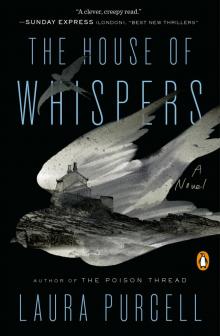 The House of Whispers
The House of Whispers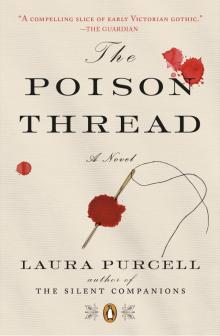 The Poison Thread
The Poison Thread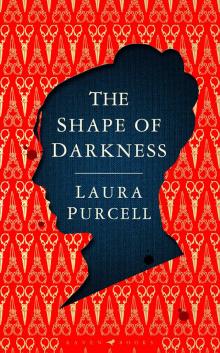 The Shape of Darkness
The Shape of Darkness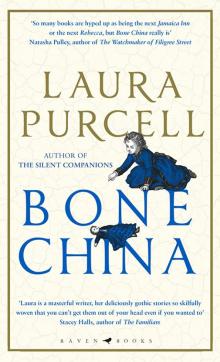 Bone China
Bone China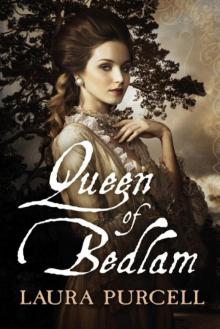 Queen of Bedlam
Queen of Bedlam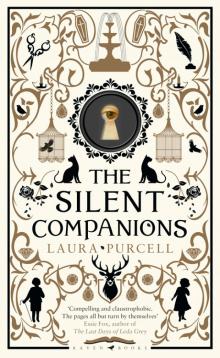 The Silent Companions
The Silent Companions